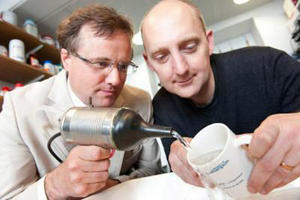WaterInnovative ultrasonic nozzle changes the way water cleans
Scientists have developed a revolutionary ultrasonic attachment for taps, which massively enhances the ability of water to clean; currently, industry uses excessive water, power, and additives for cleaning

Demonstration of ultrasonic nozzle's low-volume water usage // Source: dvice.com
Scientists from the University of Southampton have developed a revolutionary ultrasonic attachment for taps, which massively enhances the ability of water to clean.
Currently, industry uses excessive water, power, and additives for cleaning. For example, it can take up to 100 tons of water to produce one ton of clean wool after shearing. Many industrial processes also generate large quantities of contaminated run-off. The water from hosing down an abattoir represents a real health risk and cannot be allowed to enter the water supply. Purifying run-off is costly — each cubic meter of water used for cleaning in the nuclear industry can cost around £10,000 to subsequently treat.
A University of Southampton release reports that Professor Tim Leighton and Dr Peter Birkin’s device works with cold water, minimal additives and consumes as much electrical power as a light bulb. Its application will be wide — licenses have already been sold to a number of industries to look at cleaning in food preparation, hospitals, manufacturing and the home. The new technology consumes less water and power than the established competitor technologies.
Talking about the need for such a technology, Professor Leighton says:
“Society runs on its ability to clean. Ineffective cleaning leads to food poisoning; failure of manufactured products such as precision watches and microchips; and poor construction — from shipbuilding to space shuttles — since dirty surfaces do not bond. The impact in healthcare is huge — hospital-acquired infections, from instruments that aren’t properly cleaned, cost the NHS £1 billion per year. There’s a very obvious need for technologies that improve our ability to clean while saving on our most important resources, water and energy.”
The release notes that last Thursday, in recognition of their invention, Professor Leighton and Dr. Birkin were awarded the Royal Society Brian Mercer Award for Innovation 2011.
Using the £250,000 award from the Royal Society, the team will develop products based on an ultrasonic nozzle which can fit on the end of a tap or hose. The device uses less water and power than the equivalent pressure washer (approximately 2 liters/minute compared to 20 liters/minute and less than 200 W compared to 2kW). It is also far less damaging as the stream pressure is less that 1/100th that of a pressure washer. Another advantage is that it generates far less runoff and aerosol (tiny atmospheric particles of water that can carry contaminates into the air to then settle and contaminate other surfaces). As it is able to use cold water, energy is saved on heating water.
Power washing generates large volumes of contaminated run-off and aerosols, presenting a hazard when used, for example, in cleaning sewage systems or nuclear contamination. One of the main pieces of equipment currently used for industrial cleaning, ultrasonic cleaning baths, can only clean objects small enough to fit in them and the devices to be cleaned sit in a soup of contaminated liquid. Neither power washing (high-power pressure washing) nor ultrasonic cleaning baths can easily be scaled up and neither can be used on delicate materials such as hands or salad.
The new nozzle generates both bubbles and ultrasound. Both travel down the water stream to the dirty surface and there the bubbles act as microscopic ‘smart scrubbers’, seeking and entering crevices to remove dirt there using shear forces in the same way that currents in a babbling brook can strip off riverbank soil . The device can be used at a high-power and a low-power setting — the latter being suitable for delicate products like hands and foodstuffs.
Licences to enable companies to bring the technology into their product lines have been negotiated with a number of companies to explore cleaning products for hospital hygiene, dentistry, food preparation, manufacturing and the power industries.
